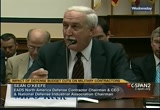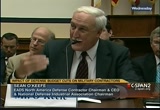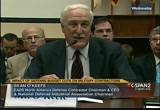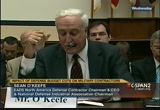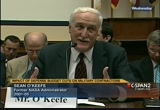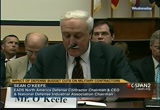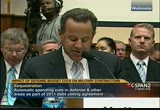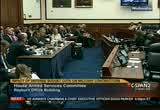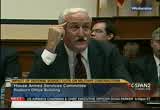tv U.S. Senate CSPAN July 20, 2012 5:00pm-6:59pm EDT
5:00 pm
does purchases, $15 billion worth of commercial and other activities in the united states every year. 70% of what we do is commercial, 30% is related to public contracts. yet many of the suppliers are much the same period for aerospace article that apply and in some cases, we do roughly 30% toward the commercial side of the equation. the cost of doing business for many of the second and third tier providers is going to go up significantly. some of those providers will elect to either exit one element of the market, defense and in particular, or public spending and as a consequence, the options for competition to maintain cost competitiveness is going to be much different. in the $15 billion a year that
5:01 pm
my company invests to purchase goods and services in the united states. some of those seven tier providers will exit the market and when they do, there will be less choice and the cost of doing business will go up. in the defense market, those same products cost in a public market at least on the order of 20% more to do business. those suppliers will exit the public defense market faster than any other. just to shed that 20% overhead that it costs to do business. as a consequence, it becomes an easy choice or one they are driven to in order to just survive. that is an opportunity to examine what that cost of doing
5:02 pm
business is uniquely to the public sector. if every article or most require roughly at the same comparability of its application in a commercial or defense context, why does it cost that much more just to sell to the public? that has an opportunity for re- examination. defense business board has advocated a regulatory holiday. during the 1990's, the administration refer to this as a precarious and holiday. -- precairment the same can be e cases in which 20% of the cost could be reexamined on a case by case basis. it demonstrates --
5:03 pm
they have come up with it. creative -- they have come up with a very creative methods to do that. that is to looking at a mine last application of no priority, everything is a priority. that is an overhead that i would encourage as an opportunity to really look at what those expenses could be, to yield a lower cost and ultimately to accrue savings. maybe this is the most important element. while there will be -- a reduction in this area of domestic discretionary willpriations, it's resonate a different way. we are looking down and we have public servants for delivery of
5:04 pm
public services that require personnel and as a result, how the federal government goes about the process of determining how those reductions will be made is something you have to be heard from. while there may be a prospect of fewer tsa agents at the airport on any given day or disruptions as a consequence of the faa air-traffic controllers not been asked to report for duty that day -- there will be fewer research grants because be nih or the national science foundation is withholding the grant that was required for research activity. all of those are severe impacts. by comparison to the impact that will be on the armed forces in the u.s., men and women in service will voluntarily -- the impact will be profound on them
5:05 pm
and their families. it is worthy of consideration of what the consequence will be that is far greater than anything we are talking about this morning. >> are you close to -- > >> and done. i commend the committee for seeking resolution to this issue. i very much appreciate the opportunity to testify. thank you. >> thank you. >> -- is your mic on? get it close. >> i appreciate the opportunity to testify before you today regarding this serious matter of the potential for sequestration and the implications it has to our defense industry. as you know, i wear two hats. one as the president of the $13 billion company that employs more than 36,000 employees
5:06 pm
worldwide and second as the chairman of the aerospace industry association, which represents 300 aerospace companies across the u.s., which collectively account for 90% of the revenues for the aerospace and defense industry. i commend the committee on assembling such a representative group of witnesses to provide diverse answers based on the different challenges faced by each of us in the coming months. the chairman of aia -- i have visited capitol hill to outline what we see with regard to sequestration, the potential to affect over 1 million highly skilled aerospace and defense related jobs. the campaign has been spreading throughout the country with grass-roots rallies, highlighting the importance of sequestration versus suffering its consequences. as an industry, we are already seeing the impact of potential sequestration budget cuts today.
5:07 pm
companies are limiting hiring and halting investments largely due to the uncertainty about sequestration cuts being applied. at our sister division, the leadership has already indicated that given this environment, if they had to choose between investing and internal dollars between commercial and defense programs, the witches commercial programs. because of the uncertainty in the defense budget. that is a fair amount of uncertainty in the commercial environment right now. equally concerned are the impacts of sequestration on the domestic side as it relates to homeland security, border security, aircraft control, tsa, and other agencies. the sequestration threats facing other government agencies contracts the work force and affects our ability to do business safely and effectively. in the near term, some clarity from the office of management and budget about house sequestration cuts would be implemented will be helpful in
5:08 pm
terms of avoiding some of these impacts. regardless of how the cuts are implemented, the consequences for the industry would be dire. the industrial base tax force has reported that sequestration results in the closure of production lines and layoffs of skilled workers. it reduces the ability to respond to the needs of the u.s. military. however, i am here to offer my view on how sequestration will affect us directly and share with you these are becoming a reality for us. we build jet engines for the commercial and military marketplace. as you know, our future military based market consists primarily of the 135 engine 40 f-35. we are proud of our engine
5:09 pm
chosen to power the next generation. these will not really add to our production business until 2016 or later. with the end of the production run this year and potentially the end of the production run for the engines for the c-17, the f 135 engine is our future for our military business. already the decline in defense spending is affecting the f-35 production ramp and our engine production. as you know, $487 billion in budget cuts are announced and that has pushed at 179 f-35 aircrafts between 2012 and 2020. original projections a few years ago have had as building over 100 f 135 engines per year. this year, we will build over 50. half of that number. next year, our f-135 will actually increase. if sequestration will take
5:10 pm
effect, that number would decline dramatically. it is not just new engine deliveries that are impacting it. spare parts are the key to keeping our manufacturing base. flight hours have been cut back in sequestration will result in further reductions. this undercuts demand for our spare parts and overhaul work. for my company, the scituate it poses a work force and supply based problem. as the f-22 program winds down, i am transitioning many of these workers to be f-135 protection. this is extremely difficult, getting the near-term production. with sequestration come it will be more difficult to retain those highly skilled employees. quite simply, my work force is aging. specialized and highly compensated. if and when we go back up, the curve is steep and will affect
5:11 pm
production quality and training, which adds time and cost. this is unique because from a production standpoint, a jet engine is a jet engine, whether it goes on a military aircraft or commercial aircraft. this allows us to absorb disruptions between -- better than small companies. for a short time, i might be able to move employees between military and commercial programs, assuming i have an increase in demand for the commercial area. i have to take a risk if there seems to be a reward at the end of the day. this is like putting a band-aid on a bullet wound. in terms of our supply route, they are struggling. many are small businesses, making specialized cars for military engines that simply cannot survive another production decline in disruption. we continue to hear from our suppliers that if further cuts take place, we would be forced to lay off employees.
5:12 pm
one large supplier says they do not believe that d.o.t. will produce the number of engines. this uncertainty makes us less willing to enter into long-term agreements and drives our cost up to date. if sequestration were to go into effect, no amount of juggling will preserve my work force or help me maintain our supply base. the step down in current production ramp for that 135 mean some people will lose their jobs. it means that reduced volumes for suppliers which means costs go up. it puts a good program in a very tenuous position, a program we cannot afford to lose. to reiterate, make no mistake, it is dangerous to the war fighter and for us as a business and our supply chain companies and for us as a nation. again, i appreciate your perseverance on this topic.
5:13 pm
and for your allowing me to be your today. thank you. >> thank you. >> thank you, mr. chairman. a ranking member smith and members of the committee. thank you for the opportunity to testify on sequestration implementation options and the effects on national defense industry perspectives. i am the president and ceo of william speier wrote in fort worth, texas. we design and manufacture innovative products including custom cables, connectors, adapters come up test equipment, and intelligent power management systems. our products that improve the safety, reduced aircraft downtime, boosted buying power of the defense and procurement dollar. we currently have 89 employees.
5:14 pm
they continue to amaze me every day. i have been here since day one. as a manufacturer, i very much appreciate your focus on defense industry and the impact at the cuts set to begin on january 1 of 2013. well i wish i were here under better circumstances and the impending threats of these wholesale budget cuts, it is a deep concern to me. my goal today is to put a face and a name to what is rather cavalierly discussed in the press as sequestration. most people would associate defense cuts with a big defense contractor, which are represented by several of my colleagues here today. supporting every one of these large integrators on dozens of
5:15 pm
programs are thousands of tier 2 and your three suppliers. most are small and medium-size businesses who design and manufacture what seems like a small parts. moreover, the defense supply chain companies collectively employ millions of hard-working people who each support spouses and children and community. these cuts will not just impact a few companies. these cuts will slow down the supply chain and through the broader economy. they will impact companies like mine. they will threaten the jobs of thousands of skilled workers. in fact, at a report released last month by the national association of manufacturers concludes that by 2014, the cuts in defense spending enacted last year combined with the cuts set for january 1 of 2013 will result in the loss of more than
5:16 pm
1 million jobs. increasing the unemployment rate almost 1%. just in texas alone, this meant than 100,000t more jobs. manufacturing is an engine of economic growth. why are we making decisions that will inevitably stall that engine? the budgetary issues, the federal government faces them. they are the same one that i deal with every day in my own business. analysts say the defense industry is faced with several choices. either exit the market, a double down on defense by buying your competitors, or whether the storm. at our company, we have chosen to invest in product development. these are major investments.
5:17 pm
we are committed to developing products that will meet the military requirements. i believe that this dedication to provide innovative progress helps to illustrate the potential impact sequestration will have on my business and many others. sequestration will create an exodus of talent and skills to other industries. we presently have almost 90 employees, including assemblers and engineers. experienced in mechanical, electrical, software, from where, hardware, and manufacturing. these jobs are in jeopardy. what is being billed as a stopgap budget fix it will have lasting effects on our defense
5:18 pm
capability for years to come. the switch will just not get flipped back on to reverse that trend. moreover, the deep personnel and program cuts will threaten our national security. indeed, the united states could lose our technological and strategic advantage and never get it back. in conclusion, i urge members of congress to go back and sharpen your pencils. sequestration is cosmetic surgery with a chainsaw. working together, we can solve this. we need to do it smartly and strategically. while keeping the economy moving and defending this great land. thank you very much for inviting me to appear before you to talk about this very important issue. i would be pleased to answer any of your questions. thank you. >> thank you.
5:19 pm
i think we on this committee all understand, more than perhaps the rest of the congress, how serious these will be on our military and of our industrial base that you have laid out. i have a series of questions that could be answered very briefly. i would agree to to do that so we get these things on the record, which will help us as we go for. based on your testimony, it seems to me that you believe that sequestration goes into effect on january 2 and there will be job losses. can you each confirm at this time that layoffs are reasonably foreseeable? >> yes. thank. >> yes. >> thank you very much.
5:20 pm
>> do you believe we are obligated by the spirit of the letter of the worker adjustment and retraining notification to give conditional notices to your employees as a result of sequestration? in advance of making a final determination regarding which specific employees will be let go? >> given the uncertainty today, yes, we do. i like that answer. you have a specific history regarding the helicopter that is very important. could you expand on that? >> we knew there would be layoffs at a particular site. we did not know which employees
5:21 pm
would be laid off. we did not issue notices at the time of that termination. we opted rather to do internal planning to see if we could replace the worker in another assignment either in that location or another location, look at dimensions of the business we might have to provide flexibility -- that process took 45 days. in the subsequent evaluation of the termination claims that is typical in a termination environment, we have an opinion from the defense contract audit agency that says we should have acted more timely and the costs associated with that 45 days may well not be allowable. they might be viewed in their draft opinion that our actions were unreasonable, that we waited an unreasonably long time. experiences like that inform us in an odd way of the compelling requirement to take timely action and not allow the
5:22 pm
ambiguity of the situation to accrue against the interests of the company, even though in that case, our preference was our judgment to act prudently. >> you are still on that position? >> yes, sir. it has not been concluded yet. >> thank you. >> i concur. i concur with your question and we will be compelled to do something in that regard. yes. >> we would certainly abide by the requirement. we have certain advantages in our business. 80% of this as -- is the fence. 25% of our business is defense. depending on what is happening in the other elements of business, we might have the potential to redeploy people.
5:23 pm
it is far from certain. when you were looking at budget cuts in the order of magnitude that sequestration would involve, certainly there would be scenarios where we would be looking at proportional headcount reductions. >> thank you. >> i do not believe we are covered because we are less than 100 employees. even if it does not change -- if we do not get some contracts soon and i do not see how we will be able to keep our employees -- the sequestration will cut drastically. >> thank you. barring additional guidance from the office of management and budget and the department of defense on the application of sequestration, do you believe that conditional notices will
5:24 pm
have to be issued this fall prior to january 2 to comply with the warn act? how many employees do you estimate will receive those conditional notices, and if you will not have to issue conditional notices this fall, what extenuating factors affect your decision? >> yes, sir. i think that we will be compelled to issue notices. there is an ongoing discussion about how many warn notices will need to be issued and exactly when. there is so much uncertainty in this environment. i think that will be a capstone sirmente that the committee wrestles in your deliberations but we do know several things. we do know that sequestration is the law. we do know that law takes effect january 2. we believe any reasonable modeling around the law will require significant reductions in force with double-digit reductions in the budget. in the past when we've had budget reductions we look internally at a strategic assessment of our company because if we cut the clock uniformerly it will be uneconomical and those costs
5:25 pm
will flow back in the future. that restructuring will likely mean we will have plant closings. plat closings and significant reductions in employees will trigger the warn act. the question becomes when. our best judgment, as we try to put pencil to paper with all this uncertainty about planning, is that agencies will actually move closer to january 2 because the act requires a $55 billion reduction in fiscal 2013, but the act takes effect after the first quarter. so the $55 billion has to be reduced over nine months, not a year. every year that's delayed after january 2 makes the magnitude of the reduction to accumulate $55 billion in the year more. if three more months go by, the equivalent of $110 billion would have to be taken out of the agency which would be more and more disruptive. so i think as people come to terms with their
5:26 pm
responsibilities in that sequestration is the law and we must prepare for it, there will be an impetus to move closer to january 2. we need to be prepared to enable agencies to make those determinations because of that preparedness of, we'll set back 60 days, or in the case of new york, 90 days from that. the question is which employees would be terminated. we don't really know. we'd have to broaden the notification under warn appropriately. we are very hungry for more guidance, very hungry for more information so we can nairy this and behave responsibly. >> and yet when we held one of our hearings in september and we asked the assistant secretary, dr. carter, what they were doing to prepare, his comment was rather flipant. we don't have to do anything to prepare. we just take the budget out,
5:27 pm
take the percentage off of every line item so it takes no manage. i just think that is totally irresponsible. mr. o'keefe. >> again, i think much as you heard from others here, absent any specific guidance on how this should be applied, we will be compelled, as a matter of compliance with the spirit of the law of following through on the warning act provisions. now, we've already begun that process. again, we've notified many members of congress that represent constituencies and districts in which we operate in as well as the governors of those states that this provision will have applicability. we're assessing at what point we have to make that determination. and much as you heard from bob stevens, we have to make that choice as we see the time unfold here absent any guidance that's going to have to be sooner or later. again, the determination from the office of management and budget and d.o.d. will prescribe that. but much what you heard as well from dave hess, 70% of what we
5:28 pm
do is commercial related. we are going to have options and alternatives, but there are going to be very specific contracts and programs that will be affected that are federal contracts across the board. and once we get those more specifically targeted, that will be focus and where the warn act applications will occur. >> thank you. mr. hess. >> we will certainly abide by the regulations of the warn act. as you heard from my colleagues, you know, given the amount of uncertainty in terms of how the budget reductions play out and also given the opportunity to maybe redeploy people to other parts of the business, it's not clear to us today that we would trip the threshold involving implementation of the warn act. with respect to conditional notification, we are still considering that possibility. >> thank you. >> i understand you're not affected by this, but please
5:29 pm
explain whether any of the exemptions to the 60-day notice of the warn act requirements are applicable in this situation. for example, could your company claim that layoffs results from sequestration were sudden, dramatic and unexpected? >> we don't believe so. >> no. they're well forecasted and anticipated. we're motz in advanceed and -- we're months in advanced and we see it coming. >> they say sequestration will occur on january 2. not contingent on anything. it's the law of the land and we're obligated to plan on it. >> even though some in the administration say it's not going to happen, don't worry about it, you feel you're bound by the law? >> we have a fiduciary responsibility to our board, to our shareholders and our employees to plan based on the laws in the books today. >> and aside from issuing notices to your current employees, how has the
5:30 pm
possibility of sequestration impacted your current hiring practices or that of your industry partners? >> well, sir, we slowed down on the i think very simple and logical premise that if we're going to engage in significant reductions in the work force in january, it's prudent to bring people on for six months. what struck me as more interesting and maybe more telling t the ..recruiollege campuses. we do get a million resumes a year from very talented young people, and i know you interact and members of the committee interact with these young people all the time and it gives you the optimism of the future of america when you have the ability to seele talent and -- see the talent expressed by these graduates. they started to ask whether they wanted to come into the industry or specifically with our company even though they love the technology and they love the mission because they question, if i join you now, will i have a
5:31 pm
job next year? these are very smart k ant th sm these are very smart kids. we want them because they're smart people, and they're smart enough to realize that this uncertainty may cause them to look at other options for their career.and we want the best and brightestdu so we and the defense industries to weaken continue te innovate the products andr wome services that are women and men. in the armed forces relied upon to keep themselves safe. >> mr. chairman, i would say wou that we have slowed down we've slowed down hiring as a consequence indirectly of sequestration. what's occurring now is requests for proposals, range of different contractual activities are all shifting to the right in the federal activity. it's all been delayed. so as a consequence of that, it refocuses your attention. we are not going to hire folks in anticipation of what we think is going to be market opportunities coming down the road that we think we can compete more successfully.
5:32 pm
we've slowed that down significantly. >> so even though you've been told that it's probably not going to happen, don't worry about it, the department is already slowing down in anticipation of it happening? >> absolutely. >> there is no question. >> thank you. mr. hess. >> clearly the threat of sequestration is tempering our decision today with respect to hiring and capital investments. quite honestly, we've seen companies in the past that have made decisions to invest and are suffering the consequences today, for example, in the joint strike fighter program. i mentioned the fact that the lines we're looking at, production volumes, are about half of what they were forecasted to be. companies that invested based on the prospects of a much higher volume are now struggling. in fact, some of them we have examples, small businesses like williams that have gone chapter 11 or chapter 7 because they can't support the cash flow. they made decisions based on forecast of growth. sequestration would only exacerbate that. >> ms. williams. >> i feel that i owe an
5:33 pm
obligation to my employees to explain this as well as i can to them so that -- i mean, they get very nervous about this word, sequestration. they are like, what does this mean? but i owe it to them so that they know what might be happening and whether they should go look for another job. and believe me, i don't want to lose those people because they're longtime employees, but this consumes about 50% of our business, a little over 50%. and i think my hands are going to be tied if all of this happens. >> thank you very much. mr. smith. >> thank you. first of all, just out of curiousity, have even of you been told, it's not going to happen, don't worry about it? >> in my case, sir, there's lots of discussion when we engage in a dialogue about what we should prepare for, and there are suggestions that a remedy
5:34 pm
will be developed. sure. i would say -- and i think your comments earlier certainly reflected this, sir, there are lots of opinions and there are lots of points of view, but we hold ourselves to a set of standards that i know you and the committee expect business leaders to hold themselves to. >> i understand that. further question. the chairman said a couple time the administration's position is it's not going to happen. >> we're preparing. >> don't think that's accurate. >> we are preparing. >> the administration is aware of the fact that this is the law and until we cheaning it it's potential. they don't want it to happen. nobody in this committee in this room wants it to happen. the problem isn't so much a matter of preparation. the problem is that the law is regrettably on the books, and coming, and we have to find a way to change it. and towards that end -- and i do have a question at the end of this -- but i think what we've learned here is that government spending kind of matters.
5:35 pm
you can't just blindly putt it and assume there's no problem which is sort of what led us to this horrible deal in the budget control act last time was, you don't raise the debt ceiling, it's no big deal. that will get us to a balanced budget. that will work. government spending matters. so does private sector. so does keeping taxes low. but we can't simply blindly say whatever you cut from government it will be fine because they are not really doing anything that important anyway. and it is that attitude that led us to where we're sitting here. the notion that you didn't have to raise the debt ceiling and then if you put in place mandatory cuts it really isn't that big of deal. so i hope that lesson will be learned. and as we go forward looking at our budget situation with $.3 trillion deficit, as i mentioned, even though tomorrow we say we won't do sequestration, i'm curious as you look at the next 10 years.
5:36 pm
a boom time for defense contractors, no matter what happens, sequestration or no sequestration, we've got pretty tight fiscal situation for the next 10 years. how are you looking at that? how are you anticipating the impact of simply the reality of, you know, revenue being in one place and spending being in another and the need to reconcile that and the reality that the defense budget right now is 20% of our budget? how are you planning for that over the next 10 years? >> the way we're focusing our business now is to accommodate the reductions already in the budget control act of $487 billion that defense secretary panetta has spoken about that's embedded in our national security strat he gee. -- strategy. a number of our programs have been capped, canceled. we slowed down our programs. our work force is 18% smaller today than it was three years ago. we're hitting the brakes there. we've taken out a million and a
5:37 pm
half square feet of facilities. we will take out another 2 million square feet by 2014. we cut our research and development. sizing the cloth of the business to meet the market reality. we're also looking to work with the administration and the leadership in the pentagon at international work because our nation has asked others to step up as security cooperation partners, as good security cooperation partners, if we have interoperable systems we could do well together. they burden share some of the expense, and any incremental work flowing into our businesses stabilizes our businesses, stabilizes the work force and it lowers the cost of every bit of equipment that the u.s. buys for u.s. purposes. so that's how we focus the strategy in the business. >> if i could, mr. o'keefe, maybe you could take a stab at this one. how worried are you, give given the budget reality, that that reduction number will go above
5:38 pm
the $487 billion that's currently projected? if i could piggyback on that projection. there are a number of studies coming out now that the pentagon's plans to, quote, reduce that spending over the course of the next 10 years, don't really quite add up. what they say get them savings doesn't. it will wind up costing them more than that. do you think it will be more than what's currently been talked about? >> it's certainly possible. if there are reductions we'll do the best we can to accommodate our business. ande done it historically we'll continue to do our very level best to size the business so that we can deliver against these commitments. i think the greater concern we have is that the resources that are available for national security alined with a strategy of -- aligned with a strategy. >> does anybody else want to comment on that? >> to pick up on the last point, it is yet to be mentioned. this is the first time we've seen in the course of better
5:39 pm
than 40 years in which every change and reduction in national security spending in that span of time has been precipitated by a change in strategy to accommodate or to recognize a different threat level. this hasn't happened in this case. this is purely exclusively driven by the financial realities of -- >> if i may -- >> yes, sir. >> we just took $175,000 troops out of iraq. we're drawing down afghanistan. there are national security changes that are precipitated. some of it the budget is part of it. there have been, you know, just like in those previous cases, changes in our national security needs based at least on iraq and afghanistan. >> there has been accommodation to that. i think you also suggest, as you have in your opening statements as well, that much of what we're seeing going forward here is going to be a
5:40 pm
consequence of the fiscal uncertainty and less about the threat. so it's very difficult. it's near impossible from where we sit to anticipate exactly what kind of market changes that will involve. and i think very realistically there are pearg back expect -- parring back expectation will look like. and what we are seeing is a gravitation towards second to third tier suppliers to those that are far more commercially oriented. >> it would help if the government have more revenue so it is not forced into as bad of a budget situation. would any of you disagree with that assessment? >> i think the choice of exactly what spending and revenue balance is is more dominantly of your portfolio. and so as a consequence, i'd defer the answer to that, sir. >> that is true. i yield back. thank you.
5:41 pm
>> thank you. mr. bartlett. >> thank you. 20 years ago i sat in the most junior seat on this committee and frequently frustrated particularly in important hearings like this that time was going to run out before i came up in the cue. sensitive to that frustration, i would like to yield my time to the most junior member of our committee here, that's mr. west. >> thank you, mr. bartlett and thank you, mr. chairman, and mr. ranking member. i'd like to try to get a little bit more specific. i'd like to know from each of you what are your four major weapon systems programs or developments that you have the most concerned being affected by sequestration and, of course, the corresponding work force concerns as well. so if you could give us that idea of kind of your top four. >> i want to be responsive to your question, sir. when you align the top four with sequestration, one of the challenges we have, our understanding of sequestration
5:42 pm
is across the board. >> irregardless of sequestration, what are the top four that you think will cause you concerns if they were affected by sequestration? >> undoubtedly the joint strike fighter program. undoubtedly programs in missile defense, and there's a portfolio associated with missile defense. without question programs like latoral combat ship, excelling combat capabilities. and then an array of classified or intelligence oriented programs. all of which, as we understand the environment, would not be immune so the support service we provided the intelligence community would be adversely impacted. >> how about work force impacts? >> our best estimate, which i admit, is sufficiently crude, i am a little embarrassed to offer it, 10,000 people, but we've done it at the back of the envelope where we've made up the assumption of 120,000 people, in the neighborhood of 10,000, that number could be more or less depending upon will there
5:43 pm
be accounts that will be excluded as the chairman and ranking member said. there is still yet information to be determined. we'll shape our outcome there. i think 10,000 across the board is about the best answer i could offer. thank you, sir. >> well, sir, the three i would highlight in particular are the first and foremost, the uh-72 lakota helicopter, the program that is frequently recognized by every audit service and the defense department overall as on time, on budget for over 225 aircraft thus far without any exception to that whatsoever. that could be compromised as the changes and production rates alter, that will almost certainly cost increase per unit and that will be the first time in the entire experience of that program that we would see a cost increase or a failure on delivery.
5:44 pm
i really would hate to see that record of absolute achievement compromised or blemished even for a moment. the second, as much as bob stevens described, is the combat ship. we have a lot of interest in the systems that are engaged there for radar and a variety of other activities all of which will turn on whether or not the number of vessels -- commission for production and contracted will be engaged. uncertainty for an for a period of time which therefore takes whole upets and defers them until there is time certainty. and the third is the united states coast guard. often recognized as a very strong support element of the defense establishment and national security overall, we produce most of their helicopters and a good number of their cargo aircraft. all of which by contract at this point have a prospect of being deferred given the very small
5:45 pm
maneuverability that this particular agency has for their capital accounts. we don't know what will be. so trying to estimate the number of peoples will be not impossible to figure out what would be involved here until we see what those exemptions are as well as which programs in specific may ultimately have to deal with that if they are all going to be applied across the board evenly. >> for pratt-whitney, we are seeing significant engine delivery reductions in our legacy engine programs. certainly our sole source engine on the f-22, now that program has been terminated, we are finishing up some spare engines. for the c-17 and f-16 where we deliver military engines, both of those program delivery rates are declining as well as they shift largely to international sales. we were counting on the ramp up
5:46 pm
and the increase in the joint strike fighter program that bob talked about with our sole source engine there to offset those declines and really kind of stabilize our operation and enable us to maintain our industrial base. as we see that program continue to be delayed, the last recuxes that support the $487 billion in reductions took on 187 airplanes out of the sky. so that impacted our delivery rates. and we were looking for the ramp up in the tanker program. but that doesn't start until 2016 and beyond. so joint strike fighter and tanker will be the most important programs for us. >> the weapon systems, test equipment that we manufacture for all aircraft that we do currently for f-16, f-15, f-18, the a-10 program and the f-35
5:47 pm
and some on the f-22. but this concerns me because we go to the air force bases and recently we saw 1969 technology still being used. do you remember 1969? rabbit ears, transistors. >> i was only 8 years old. [laughter] >> the gentleman's time has expired. >> thank you, mr. chairman. my time has expired. >> thank you. mr. andrews. >> thank you, mr. chairman. thank you, ladies and gentlemen, for your testimony this morning. i agree with you completely that i favor repeal of the sequester as soon as we can possibly do it for many of the reasons you very well articulated here this morning. i also acknowledge the responsibility to understand the comments that admiral mullen gave us when he was chair of the joint chiefs of staff in which he recognized that a country that borrows 40% of its operating funds can no longer
5:48 pm
be a strong country. inevitably, the national debt is a national security issue. the way we got into this mess is that for five decades people on this side of the aisle and people on that side of the aisle have gone through the following exercise. whenever anybody brought up a reduction in spending, we had hearings about how bad that was and who it would hurt. and whenever anyone brought up an increase in revenues we had hearings about how bad that was and who it would hurt. so we made a series of decisions that you would never make in your fiduciary responsibilities. we made stovepipe decisions about those spending programs and those revenue increases in isolation. that's how you create a $17 trillion debt. how you get out of it is to do things that people do not like. i think most of you would agree that since nearly half of our budget -- i guess more than half of our budget is social
5:49 pm
security, medicare and medicaid, that we have to do something about restraining the growth of those programs in an equitable way. i agree. that's why i'm one of the fewer than three dozen people who voted for the simpson-bowles budget proposal, mr. cooper put on the house floor in march. it will stipulate that -- i think you would agree with that. let me ask another question. it's become an article of almost religious faith around here for some members that any revenue increase at any time on anyone should be taken off the table. who here agrees with that proposition? >> let me speak. i don't think you'll hear any of us here today arguing against the need for fiscal responsibility. we have jobs to do running the companies we run. i can look honestly at my
5:50 pm
colleagues here saying we're first and foremost americans. as possible talked about, we are all making decisions today to deal with the 10% budget reduction that's already been enacted and being planned on implemented now. we're making decisions in terms of head count reductions. we're right sizing our companies. we're closing facilities, consolidating our footprint, making the tough decisions and taking the tough actions to deal with the need for fiscal responsibility. we i think are supportive of that and understand that. >> mr. hess, if i may, the specific question i asked was, who here would advise the congress to rule out under all circumstances any revenue increase on anyone at anytime? would any of you make that recommendation to us? think say that i don't any of us are sitting here today presuming that we have the wisdom to recommend a solution here. >> no. i don't think it's a matter of wisdom. i think you have a lot of wisdom. do you have an opinion? you are an american citizen. you are the leader of a major institution. do you or do you not think it's wise for congress to rule out all revenues on all people at
5:51 pm
all times forever. do you think that's a wise congress, -- thing for congress? >> i think you have to put everything on the table. >> i know when we face challenges in our business -- and i don't intend to imply that the challenges that we face come close to the magnitude of the challenges you face on this committee or that congress faces. it makes ours look pale. we try to put in the recipe every possible ingredient that might lend itself to the formation, not just of a solution but in a perfect world a flexible array solution, comprehensive, thorough that allows us the flexibility to run the business. philosophically i think you'lly
5:52 pm
that in our actions. i think we're held accountable from our board and our shareholders, i think our employees expect it. >> i appreciate that. since my time has run out, i'll give you this context. social security was truly imperiled in the early 1980's and a president named ronald reagan and stepped forward and on two occasions agreed to raise more revenue for us. the reason that social security still exists today. and i think our friends on the other side would be wise to follow president reagan's example in this time of emergency. i yield back. >> all that we had president reagan. [laughter] >> mr. chairman, i want to first thank you not just for holding this hearing, for being across the country alerting the public to the dangers of sequestration long before anybody else was doing it. and also for actually putting the solution on the table. we're not going to change this
5:53 pm
by press conferences. unfortunately, the house, as you mentioned, has passed a solution. second thing i have to do is take issue with something the ranking member said at the beginning because i just believe it to be blatantly inaccurate. we did not get here because the majority of members of the house of representatives or majority of individuals across the country realize the insanity of continuing to allow an irresponsible and uncontrolled massive increase in the smothering debt our nation is mounting. we got here very easily. picture's worth a thousand words. if you look -- joe, if you could hold that one up for me. this administration decided they would spend $825 billion on a stimulus package. $347 billion of interest. if you look at these charts, if they look identical, it is
5:54 pm
identical, because what actually happened is they decided to spend in one year on a stimulus package almost the entire amount they are now taking out of defense for 10 years. and even though this package has no measurable significant increase in jobs, we know this is going to cost us between 1.5 million and two million jobs. it's important to know how we got here. but we are not the ways and means committee. we are not here to talk about tax increases. we are not even a jobs creation committee. what we're here for is looking at the national defense of this country and that's what you guys do and you do it very, very well. my big concern as i go back to the 1990's and look at all the cuts in a are taking place, and i am concerned about the $487 billion that we have already taken much less the $1 trillion that's coming, my understanding is we started that decade with 50 major defense firms and we ended up with six prime contractors. we started that decade and at
5:55 pm
the end of it we had our major surface combatant shipbuilders and our fixed wing developers fell from six to three. our tactical missile producers fell from 13 to three. and the number of tract combat developers fell from three to two. today there are just two companies, boeing and lockheed martin, that build fighter aircraft. my question for you is what impact do you think sequestration may have that might be similar to the 1990's in terms of weeding out our industrial base and the impact it may have on that over a long-term period of time? >> yes, sir. having lived through the 1990's, i think the consolidation that you described was an effort to size supply for the likely demand that has to equalibreate somehow. another round of reductions on the demand side of this will -- should we try another? there has to be a healthy
5:56 pm
relationship between the demand for the products and services that we have and our ability to supply them. so the supply chain in some form or fashion will either be graceful and focused and have a good architecture or it won't be, but it will size and shape itself differently to meet the level of demand that exists. >> i think that the shakeout in the market we're seeing right now in the second and third tier of suppliers is already a manifestation of that point. we're seeing either companies consolidate, be bought by larger primes as we've seen in the last few years or simply exited the public market. and have consolidated much more towards the vague reasons some
5:57 pm
of the commercial trends that occur but at the same time much more reliable than we're seeing as forecasted over the next decade in the public spending market. i think that's already occurring. it's happening right now. >> i guess i would have to agree with you. i think we're getting to have a very critical point. it's not the big companies you referenced. people like lockheed martin and boeing. where we see a greater concern is with the smaller companies such as represented by ms. williams today. that down to one company may has a unique skit set or technology -- skill set or technology that they're consider exiting the business. otherl go pursue or market. that's quite honestly where we're really starting to see some concern. >> excuse me. i would agree with the gentleman here that this is going to affect us greatly. >> mr. chairman, thank you, and i yield back. >> thank you very much. mrs. davis. >> thank you, mr. chairman, and
5:58 pm
thank you all for being here. i just want to say as someone representing san diego that i want to thank you for your work on behalf of your employees and certainly their families. and i really relate to what you're saying about people being affected, but as we know it is not just in the defense industry that we see tremendous affect on families today, uncertainty and i know that you have to be concerned about that. how young people are educated today is critically important to our national security and so that's a concern as well. i want to just identify myself with some of the comments and questions of my colleague, mr. andrews, because i think we do want to see this in a balanced way and i call upon you and i hope that you are considering that you obviously need to be very strong advocates which you are for the industry that you represent. but i would hope you would extend that as we work into these very, very difficult
5:59 pm
issues that we're facing. i wonder if i could count on you to do that to include those kind of comments as well and the need to balance out and put everything on the table as you ..>> i'd be happy to do that. >> thank you. what i want to ask you about, let's be strategic about this. i don't support sequestration. as we said, nobody here does in those kind of across-the-board cuts. in reality is you had to deal with cuts and different ways of really analyzing the work that you do within the budget control act and some of that extends to additional changes that may be made in the industry. and are you in a position today to suggest to us, are there reforms in contracting that you think is critically important to make? we think multiyear contracts, perhaps that could spread out some of the sacrifices, if you will, that might be made in
6:00 pm
terms of looking at the strategy that is put in place, the targeted kind of cuts. and i know, ms. williams, you spoke about that as well. what is it that we should and could be looking at? i don't want to say next generation of reform. something you talk about but we don't acknowledge as part of this whole discussion. >> thank you. i'll try first, ma'am. i will say this probably won't sound inventive or innovative in any way. it's interesting about acquisition reform, the fundamentals that seem to keep resurfacing are the same observations we have across the industry. i tell you first is stability. whether that stability is the funding environment or the requirements environment or industry's ability to hire, train, get the right people in the right place at the right time, do those fundamentals, those fundamentals drive this process substantially. secondly, if we could look at shortening the cycle times, cycle times in the industry are
6:01 pm
getting longer and longer and longer from the formation of a proposal, the early test phases, it's getting longer and time is money. anything we can do to streamline, simplify and shorten that process certainly would accrue to a portfolio of efficiency initiatives that i think would result in good savings. >> i'd simply offer the recommendations of the defense business board that reports to the secretary of defense, take them up on their suggestion. what they're proposing is simply suspend regulatory environment in which every regulation then has to justify the reasons for its application as is being sought to be applied. otherwise, dispense with it. that is an approach that will sort out this question, not our recommendations, one that the business board made to the secretary of defense in that regard, that's not an
6:02 pm
unreasonable proposition. it is a documented proposition that costs precisely the same articles, at least 20% more to sell to the public than it does in any other commercial activity. so sorting out what causes that 20% is one manner that the defense business board has recommended. i'd take them up on their suggestion and do it. >> what do you think keeps us from doing that now? >> i don't know. resolve, commitment, suggestion, whatever. it was just been put forward but it's one that would be worthy i think of inquiring -- and ofof d budget. what is aaron to with the logic that this group has recommended to be implemented, which does not disband -- this justifies what it needs to be there, or it is dismissed? it is a fairly reasonable
6:03 pm
proposition. one would love to contribute because of the additional cost of doing business. >> thank you, mr. chairman. >> the thank you. they have led three times in the house. we voted to address sequestration, but sadly, the president has threatened to veto. the senate has not taken up the legislation, but the more the american people learn, i want to thank all of you for bringing this up. also, i am grateful. a state near and dear to me. it is virginia. my brother was born in richmond. i am very proud graduate of washington and lee, and i have a son who is active duty navy.
6:04 pm
it is very revealing, particularly in northern virginia, as you look at the consequence of defense spending, it is not just northern virginia. this includes mclean, sterling, arlington, falls church, alexandria, fort belvoir, quantico. each won over $1 billion. it would be such a state affected, jobs, military families, they are put at risk. as we approach this, it has already been addressed, but there has been some confusion about the warren act. the notices, 60 days, 90 days, what is it with a minimum of 60 days. when would a person anticipate to receive the notice of layoffs, if you could give your point of view? >> i am certainly no attorney or
6:05 pm
warren at specialists, but i have been around some that think they are, particularly as you look at sequestration. this is with timely notification. this is october or early november. new york is a 90-day notification state. i think we set this back in time, and it would be the end of september, early october. >> again, we've already begun to notify members of congress who represent districts in which we operate and do business as well as governors of those respected states that we may be compelled to do this once we in the absence of guidance from the office of management and budget or the defense department. now, that will have to occur sometime prior to that 60-day notification stage. and exactly when is going to be very much contract dependent
6:06 pm
depending on what advice or guidance we receive from the administration. defined the requirements of the warn act and, again, we're -- of the warren act, and, ag ain, we are certainly prepared to comply with the law. again, given the uncertainty in how sequestration will play out, it's not clear to us that u.t.c. we'd trigger the warn act -- the warren act concern that we have. >> as i said earlier, i don't think this applies to me because i'm less than 100 people, but i still want to give my employees an update and bring them up to speed on this because they don't understand what's happening. >> and it's an extraordinary coincidence, each one of you identified a date prior to november 6 which is election day, so this is something thems. williams, as your company stopped or slowed down capital investment in an effort to
6:07 pm
conserve funds and in anticipation of sequestration? >> which we have done -- what we have done previously. the way we got our business, a lot of our business was that we would make prototypes and that's how we developed all thesebut i recently, as i was talk earlier, we went to an air force base and saw the 1969 technology. we personally invested lots of dollars in order to bring this up to current technology. we have done that. we are not through by any means, but we have done that. what concerns me is, will i be able to continue to finish that project? and if that happens i will lose those engineers. >> i just want you to know, i particularly appreciate it. i represent the communities of fort jackson, fort gordon. i currently represent paris island. i want the best for our troops. we -- for their health and
6:08 pm
safety, we want -- and we doit really is dependent on your efforts. i want to thank you for your prototype efforts and however wethank you. >> thank you, sir. mr. courtney. >> thank you, mr. chairman. and thank you for holding this hearing and the witnesses for your really important testimony here today. and i want to also note, mr. the sort of genealogy of sequestration, talking about the gramm-rudman act. there is the concept that is now lost in the midst of time a little bit and i think it's important for us to remember that was used at a time of structural deficit and one of the sponsors of it, then congressman graham, was quoted at the time saying, it was never the objective of gramm- rudman to trigger sequester. it was the threat of sequester, force compromise and action. obviously those are the critical two words that i think is our burden to satisfy here as members is, a, to compromise, and b, to act. if you finish the story of gramm-rudman, it was a bumpy ride to get to the point where we actually deal with the
6:09 pm
structural deficit that was at the time and it was not until george herbert walker bush that walked off some sacred cows to help the measure. it put in place pay-go rules. and the budget that preside but it adopted the papal rules, which you can put real discipline into proceedings of the congresspassed in 1993 which changed the tax rates that finally intersected spending and revenue to a point where the first time in our lives we actually had the government public finances in balance. and by the way, we created 22 million jobs during that time period. and when i view the budget control act, which again i join the majority of people in this
6:10 pm
committee supporting passage, that is certainly the path that i think we voted for or should have been thinking we were voting for that compromised an action what was we were looking for, not a chainsaw goingand so it's going to require people to move off of pledges and some sacred positions to really fix the problem and, again, we have a historical precedent. we can do this. our country did it. and, again, your testimony, all of you here today, again, stakes are huge if we don't. the question, again, having that horizon, that stability which really provides the basis for you to move forward and plan and invest. and coming from a district where the construction of nuclear submarines sakes roughly four to five years, obviously a one- year horizon is not enough.
6:11 pm
in terms of really trying to, you know, get to that sweet spot of efficiency and quality. and one of the measures that we've been voting on here is just a one-year fix to sequestration. and i was wondering if you could sort of comment whether or not that in your mind really fixes the problem or just delays it and just again leaves the challenge of trying to do intelligent planning sort of out there for just a short period of>> well, we're a long cycle business. our products last 20, 30, 40 years. right now we don't have six months visibility which is a unprecedented plea -- which is unprecedentedly short. and we are doing our business planning in one year, three years, five years. i think the best suggestion i could give, recognizing how complex and difficult the actions will be associated with
6:12 pm
this suggestion is a complete, a comprehensive and durable approach is i think the very best solution. when we look at the challenges in our company, we think a lot about growth. the growth of our business, and i think you could extrapolate the growth of our country is through competitiveness. that means getting the best talent, investing in that talent, getting the best innovation. that investment cycle is absolutely determined of how much visibility and how much certainty or uncertainty is in the environment. right now there is crushing uncertainty that's limiting all of that. so the more comprehensive a solution that could be put together, the longer duration of that would clear the debt chairs considerably and i think open up businesses to take action that would lead to that kind of growth that we are looking for in our business. >> to the extent that this is useful for prompting process reform and adherence with than
6:13 pm
the determination of public policy and public finance choices, that is terrific. to the extent those that it also serves to create unrest in the marketplace, a complete lack of confidence and stability because of the prospect of this sort of damocles, as it was called historically as part of religion, to the extent it can be used, this is a double edged sword. in some respects, perhaps as stock -- a hobson's choice. those that have to wrestle with this question i do not envy at all. >> the gentleman's time has expired. >> thank you, ladies and
6:14 pm
gentlemen. we appreciate your perspective. it has been very telling in terms of what may be looming if sequestration takes place. i want to summarize. uncertainty, instability, under arrest. obviously as this goes to what you pointed to along with your intellectual capital and human capital, that affects that significantly. it is those intellectual capacity assets that are most valuable, but if we lose those or those are weakened, that weakens us in the future. even if this is put off. that uncertainty is building. those things are concerning to me.
6:15 pm
if we do get to the sword of damocles, as it has been termed, of ceqa station, what effect will that have on your current contracts? while those contracts have to be terminated by default, and if so, what does that mean for your employees, for your partners, for your suppliers? at think that has a significant effect. what will happen with the restructuring of those contracts? what happens if, and what does that mean? i would like to give your perspective on what that will hold. >> we think it will affect thousands. we do not believe these terminations would be for default, because it is not a for cause termination. if the contracts were terminated. contracts can be reformed
6:16 pm
without being terminated, which i suspect will be in the majority of cases. we will just buy fewer or less, and that would require folks like us to go into the parent -- the supply chain and reschedule all of those for a resources. they will look at that action and call that a business disruption. as a result, they will formulate a claim, a request for equitable adjustment for consideration in the contract. one of the areas we are still trying to deal with is that this is a net number. this is likely to be some disruption claims. do the cuts have to be deeper than $55 billion to achieve a
6:17 pm
net $55 billion out come? all of that will unfold very broadly, probably all at once, when we get agency guidance about terminations or reparations of contracts, and that will include a huge amount of effort to prepare these claims and to deal with this administrative environment. >> the recommendation as well as what stevens has walked through, to simply add, this is going to be an appointment at for auditors. if you are an attorney, this will be a great opportunity to do all kinds of things in the future, because everything has to be subject to review. this is just about impossible to estimate what this will be at this juncture. >> i think your questions are a very good one, and one that has
6:18 pm
not been considered is clearly the cost to sequestration that has not been considered, and i think bob described it well, but, clearly, if you look at the volume of contracts that would have to be priced and the request for equitable consideration, it is a huge task, both for the contractor as well as for the department of defense to administer all of that. we do not know how that would be accomplished. >> effect i think, i have already had five contracts put on hold. they have not been stopped. in fact, idea and asked by the contractor, when can you finish this? it is that simple. they are not forthcoming. when you ask where the funds are, when we can expected, you cannot, so we are virtually shut
6:19 pm
down with those contracts right now. >> the gentleman's time has expired. mr. johnson. >> thank you, mr. chairman. i have to tell you, i have to pinch myself. i thought i might be dreaming. house republicans are holding hearings to talk about cuts to government spending and how they will hurt to jobs and the economy. it is really amazing. no one thinks sequestration is a good idea. the meat axe approach to defense cuts is irrational, and it is obviously bad policy, and it was designed by my colleagues on the other side of the aisle, the republicans, to be so bad that we would make tough decisions about raising revenues and cutting spending so we can avoid it. nevertheless, here we are,
6:20 pm
playing brinkmanship again, the same folks who self righteously opposed the president obama $700 billion stimulus package, the same folks who sneered and say that the government never created a single job in america and never would, they are now wringing their hands because of the impact on jobs of about $50 billion in defense cuts in 2013, and of course $500 billion over 10, but $50 billion next year. now, there is an easy way out of this. make tough choices and tough compromises to raise revenues, cut spending, and meet our budget targets. the president is willing to do that. but the republican solution is the ryan budget. training programs, cutting food
6:21 pm
stamps, health care for children, the senate and the poor, foreclosure prevention, and cutting taxes for the rich, and blow this up with a missile shield, nuclear facilities that nobody wants and billions of dollars of waste, far in excess of caps. with all due respect to our witnesses today, you will not see house republicans call and community leaders, church leaders, the owners of mom and pop businesses, or struggling homeowners to testify on the impact of all of these cuts to help the poor and the jobless and the sick. now, to our witnesses today, each of you are highly talented, highly sought after executives, and i imagine that you are pretty well compensated for the values that you add to your companies, and i deeply respect
6:22 pm
that. as you have made clear, they are also rightly concerned about the impact of sequestration on your businesses, your employees, and our country's national defense. my first question is, would each of you be willing to forgo the 4% to 5% of your annual income that you save under the bush tax cuts in order to avoid sequestration? yes or no, mr. stephens? >> i am afraid i am not want to be able to give you a yes or no answer to your question, sir, and i offer that to you respectfully. >> mr. o'keefe? >> sure. i think the choice of revenue and spending is entirely the prerogative of others. >> would you be willing to forgo your savings it the bush tax cuts were made permanent in lieu
6:23 pm
of sequestration? would you rather undergo sequestration, or what is your position? >> my opinion of the priority is far less significant than yours. >> you are not going to give me an answer. >> that is a prerogative that is really important for you to make those choices. >> i got you. how about you, ms. hess? >> i will do the same. >> all right, nobody wants to give up their 4% or 5% that they would save it the bush tax cuts were made permanent. that is exactly the sentiment that is being represented by the republicans here in congress. they will not impose any taxes,
6:24 pm
any tax increase on the as you can afford to bear it, because of the grover norquist pledge, and my time has expired. >> my time has expired. >> a justin upton on how we got here. we had last year, an opportunity to do the reconciliation or shut down the government, and all parties were involved. since then, we have passed in the house house a solution that pays for the first year of a solution.n
6:25 pm
we have taken action in the house. the senate has done nothing but talk. all they have to do according to the constitution is passed the bill in the senate. then we would go to conference, and then we would have real negotiations and talk because plants had been laid out, but the senate has refused to take action, and the president has not given the leadership and direction to get it passed this point, so that is just correcting the history. >> thank you for being here. we do have different things. i fall into a different camp. i believe business is in bed with this. and the higher the tax rate, the higher the cost, and therefore
6:26 pm
the less they get to sell, they're forgetting -- giving an advantage to the overseas competitors, and if you listen to the president's initial speech, a couple of years ago, they talked about the fact that we needed to reduce the corporate income tax rate. he then turned around and withdrew and never gave us a specific proposal, but 18 months ago, i was a small-business owner. i will tell you that what i've found in my small business was my percentage of fixed costs were higher. i did not have the ability to do this the way the other competitors do. the last dollars worth of revenue -- the amount i paid income taxes, -- have you found
6:27 pm
that to be true? >> that is true. very much so. >> and that is where i am concerned about this anti-profit mentality that some have in washington right now, while our large industries, and i certainly want all of our large industries to be profitable, but it is what we are doing with the small businesses, and this goes with the large eyes. if you use a% of your revenue, and 8% revenue loss would be much greater on her, on her business and employees, so i want to go to you, because you talk about the back of the on the mathematics. you have got approximately an 8% operating margin in your business. is that correct?
6:28 pm
>> it is closer to 10%, but, yes, sir. >> and your problem is just about 6%? when you talk about your back of the honorable a mathematics, you have got approximately 120,000 employees. multiplied that, 10%, which will be a revenue. 80% some of your revenue is government business, so that is a 8% loss. that does not correlate. it also correlates with what you say your reduction in employees will be. nobody gets a paycheck. is that a fair statement? >> we performed against a set of objectives every year. it is an important objective. if you do not generate a profit,
6:29 pm
that would be correct. >> with public held companies. what are your obligations with regard to sequestration? hal is the impending threat of sequestration affecting your reporting, your shareholders, and the fact that this is currently the law? there are no plans to rescind this law other than what the house has done. again, what obligations to the three of you have to your shareholders? to discuss sequestration? >> i would say it is true of every high-integrity business person we know. transparency in our disclosures, and it is important, not taking unnecessary risks, but with honesty and accuracy.
6:30 pm
the status of the business and the risks, certainly to the equity investors, we have a collateral responsibility to the credit rating agencies, certainly to our customers and our suppliers, because they are our partners in this enterprise, so we have been disclosing in 10 q's .. am short on time. >> we clearly plan to bid your to this, and we are looking to this. we do nab a responsibility to our shareholders and our boards. >> the gentleman's time has a expired. mr. ryan? >> thank you.
6:31 pm
back when i was younger, i used to coach like ninth grade basketball, and there was a stunning dynamic when you get into coaching. you can be a coach and see a coach, and they can be the most objective person in the world in analyzing their players, their talent, and then they lose all objectivity. they think their kid is of little better than they probably are, so their kids starts and all of the other stuff. in the midst of the little league season. it is just stunning they completely have a blind spot when it comes to government spending for the military. i represent akron, ohio, so we have a lockheed facility,
6:32 pm
locking defense. i get it. this is government spending, and it is creating jobs. this area we are talking about is that a cut in government spending is going to cost jobs, and that is why we are here, and we do not want to see that happen, and to have my colleagues from south carolina talk about the jobs in virginia that are going to be lost, or the warren notice, that was put in law by an ohio senator because the factories were being closed down in the 1980's, so we know what can potentially happen here, and i find it stunning that we can sit here and have a conversation about job losses because of these reductions. but turn around in the same breath and see that they had absolutely no effect.
6:33 pm
we need your help. there is a narrative in this country that every dollar that the government spends is a waste of money, should be privatized, outsourced, done by the private sector, so forth. transportation, education. i am not here to lecture anybody, but i think it is funny, because i just try to imagine if you were an energy company, and alternative energy company, if you were a smaller company, if you were a wind mill company, and there is government funded, and we need to put up windmills so we can reduce our dependency and get out of all these entanglements, you guys would be crucified right now. i am with that. i think it is a bad idea.
6:34 pm
it is terrible what is going to happen. all government funding is not bad. it is overwhelming. now, we are swimming upstream. this is very necessary. this is going to be affected by this. a guy like me, maybe we need some government funding for security in our neighborhoods, and we need to fund the program or grants. it would be crucified. i am a liberal tree hugger. government does not have the responsibility to do that. we have to get past this.
6:35 pm
this is the end result of 20 to 30 years of bashing the government, and here we are. sequestration is coming to a head right now. so i just want to ask a question. the time is short. we're going to have to go out and borrow money to make sure that the sequestration does not go online. we have got to borrow it. i do not think it is a good idea. help me make the argument to my constituents that it is ok to go out and borrow money to make sure that these cuts do not happen. can you help me make that argument? why it is that way at this point? why it is important for us to go out and maybe borrow until the economy recovers? can any of you make that argument? >> the gentleman's time has
6:36 pm
expired. he made some beautiful, eloquent arguments, but you will have to answer those for the record, it could. >> can i get those for the record? >> i will be happy to ask witnesses if they will provide it for the record. also for the record, this committee is the armed services committee. we have the responsibility to look after the defense, and we have the responsibility to provide. there is a difference between that and providing -- >> will the gentleman yield? >> -- we have a responsibility to provide for the general welfare. >> this is not the general welfare committee. this is the armed services committee. >> mr. chairman, we have an obligation to make sure that mr. stevens he is getting those
6:37 pm
bright, intelligent people. they have got a pell grant, education. >> we can go on, i am sure, mr. ryan -- >> i am happy to, mr. chairman. >> but we do not have the time, and we will now turn it over. >> i almost want to give you time to answer the question, but -- >> do you want to use your time for that? >> if we are going to have a written response, perhaps. you really are the titans of industry, big and small, and you have awesome responsibilities, not just to your shareholders and really to this nation, but that responsibility is very direct with the military, and the defense of this country, as the chairman pointed out, but your responsibilities because of
6:38 pm
your position go far beyond that. it really goes towards providing leadership. we have had some discussion from mr. johnson and now mr. ryan. i think it is really important. i do not want sequestration. i voted not to have sequestration, but the real question is about the deficit and about the financing of our government. and it is either going to be cut, we have argued against cuts in the defense industry, ok, and my question is then what do we cut, and/or, and/or do we raise revenue? and i want you to answer this question as a leader in america that each of you are. mr. stevens, what do we do? do we make cuts in other areas, and if so, what? if we raise revenue, where?
6:39 pm
>> i am flattered that you would look at this. my board holds me accountable. members of the community in which we live and work. we look toward you as leaders. you are our leaders. we have a portfolio of responsibilities in our company. that is our domain. i look to you. it is incredibly complicated services. >> excuse me. the leisure company contribute to political contributions, political action groups, and to those action groups express your opinion? >> we to contribute to them, yes, sir. >> for example, do you contribute to the u.s. chamber of commerce? >> we do. >> do you agree there should be no tax increases? >> we contributed those that we think express the view that we have, which i believe is the
6:40 pm
focus of the committee's attention today, and my role is to communicate the disastrous effects of the sequestration that will to chivvy to national security. >> i am going to forgo the rest, unless you want to answer my question. the reality is that price times now you have been asked the question. i want to ask you to take this up. you are leaders. mr. o'keefe, you were the leader of a very successful university. you have not given up your leadership role. we have a very difficult situation. we have to come to grips with the reality and put aside all of
6:41 pm
the rhetoric we have here, and we are more than willing to do this, but you also have a responsibility, and i would ask you to ponder this. if you do not want cuts in the military, then where do we cut? social security? medicare? employment opportunities? education? and what revenue do we cut, or do we do it at all? i do not want to put you on the hot seat anymore, but i would ask you to take up your larger responsibility as very, very influential men and women. thank you very much. >> i very much appreciate the
6:42 pm
spirit and context of your commentary, and that is primarily what you have offered here, and certainly we all accept the leadership responsibility we bear, and that is why we are here. we have spoken to a mechanism on have to achieve these reductions, not what the alternatives are. these are complex challenges. again, you have observed the importance of really having the opinion of citizens, and that is a separate point. there is the challenge of revenue and spending and objectives, and how that gets sorted out, there are methods to do it, and this is one we are advising is more destructive than others. not where it is applied. it is across the board, all discretionary spending, just as observed in the very opening comments.
6:43 pm
>> the gentleman's time has expired. we just received news of a terrorist attack on a bus in bulgaria, and i want to express my condolences to them and our ally, bulgaria. >> i want to follow up. when we get down to the tough question of how to avoid this, basically, it is up to us, as if everybody else in the country has no role whatsoever to play in public policy decisions. let me tell you, that attitude express is the number one biggest problem that we have, the notion that you have no responsibility in solving the problem. the on the responsibility you have is explaining to us how bad it will be in one given area. is that what public policy has
6:44 pm
come down to in this country? and i will say this, you are in no way unique. everyone is concerned about what happens. they are concerned about the tax going up or about something else, and then we come down to how to add it up. we cannot have anything to do with that. what happens is we divide and destroy, and every little piece of our country, to protect themselves and make no argument beyond that. it is much easier to say do not cut this, do not raise that tax. hard part is we all have some responsibility for making choices, and you flat refused about making those choices and dump it all on us. meanwhile, do not only flatly refused to say anything about
6:45 pm
it, but you also systematically kick our legs out from under us as we try to deal with it. even if it is with taxes, if nobody is advocating for the toxic cuts and the types of tax increases that are necessary to deal with our government, then you are never going to build the political support necessary to get this nation to support those steps. it is not going to happen, and everybody hides behind that, and i know why. and i will say this. we have a far, far greater responsibility. we are the only ones that ultimately have to vote and will be held accountable. that greater responsibility is based in, and there is no way for us to do that, but group after group coming up here and singing do not cut this, do not raise that tax, and balance the budget, and then they refuse to
6:46 pm
move the needle at all on a solution to that, refuses to take a leadership role in moving the debate in the direction to get us to acknowledge that choices have to be made, we are dead. there is no way we can get public opinion. i will close with this. from 2011, asking people what about the deficit, people say to balance the budget, and the listed every single area that the government spends money and ask if you would like to see the spending cut the same, cut, or increased. in every single category, they say foreign aid. 99% of where we spend our money, two-thirds say to increase it or keep it the same. those exact same people who
6:47 pm
express concern about the size of the deficit. and then asking if they want to raise taxes, and they say no. how do people form these opinions? they form these opinions because all they hear our people advocating for the tax cuts. this is why we get a little vexed when people up here say you are going to kill our industry. but the reason you're in the position you're in is because of the problems with the deficit. ok, what do we do to get out of it? you have nothing to say on that. or do not increase spending. so what you're doing is not helping. we often advocate for things that do not add up.
6:48 pm
i am only here to talk about my area, so do not talk about the rest. we need help in getting the public to support this. if they do not, it will not happen. >> my good friend, i sometimes disagree. this is one of those times. none of us was forced to run for this job. each of us chose to run for the house of representatives. we understand that we of the responsibility to make decisions. these people are here today at our request to talk about the guidance that they need to implement the laws that we have passed. i have not heard them say do not cut defense. maybe we should have another hearing on that, but i have not heard them say that. we have already implemented $487
6:49 pm
billion. we are taking care. you have passed a law that is going to cut another $600 billion out of defense. we just want to know how as business people do you expect us to comply with the law that was passed and carry out those upsets -- those to the best of our ability. that is what they have advocated and talked about. i come from a small business background. it was not anything like building ships or planes or boats. we sold western wear. a pretty simple little business, a family business, but even at that level, we went to the market to buy products that we were going to buy for the first half of the year, and we would go to the different booths, and we would buy shirts and hats and
6:50 pm
jeans, and they would be shipped in a timely matter so we would have inventory in february and march and may, and they would come in and expect that we had the size that we needed. meanwhile, the suppliers after we gave them orders, they would go and buy the things they needed to make the genes and the hats and the brits, and it was done in an orderly method because we did not have the government involved. they are trying to run their business in an orderly manner, and they need to know what to do in january and february and march so that our war fighters that are over and afghanistan right now, going outside the area and putting their lives on the line will have what they need to protect themselves and
6:51 pm
to carry out their mission with the direction of our commander- in-chief. i applaud them for the job that they do. i applaud all of our work force that is invested in that and gets up every day, goes to work, with the best of their ability trying to carry out their mission to see that those -- that those fighters return home. that is the responsibility of this committee, and we will continue to carry out that responsibility. i also sit on the education committee, and i can talk about things, but while i am here as chairman of this committee, we will carry out that mission of looking out for our war fighters who are putting their lives on the line. thank you very much for being here today. i have one other final question i would like to submit for the record. we have omb coming up the first
6:52 pm
of august to testify. you have all talked about things you would like to see, but i would ask if you would please describe, except for ms. williams and does not have to deal with this, so that we can give them the questions beforehand, necessary for you to be able to make decisions related to the sequestration. if you can get this to us so we can get it to them >> this weekend and book tv, from new york city, the harlem book fair, live coverage saturday at 12:30 p.m. eastern with a panel discussion on the future of african american publishing followed at 2:00 p.m.
6:53 pm
with a look at public education. at 330, cornell west since then on a panel that is happening. and at 5:00, a panel celebrating the 150th anniversary of the emancipation proclamation. sunday at 2:00 p.m. eastern, the eagle forum collegial summit with authors, including cape have alleged. the harlem book fair and the eagle forum collegiate summit on book tv this weekend on c-span2. >> this weekend on american history tv. >> thirty years of the administrations of ronald reagan and bush and clinton and bush and obama have done more to confirm the prediction of the rich getting richer and everyone else falling behind than 75 years of the soviet union, perhaps. >> from lectures and history socialism in america, colombia history professor on the rise of socialism in 20th-century america saturday night at 8:00 eastern.
6:54 pm
sunday, more from the contenders, our series on key political figures who ran for president and lost, but changed political history. this week, thomas dewey rose to fame prosecuting depression-era gangsters. the new york republican would lose about fdr in 1944, and harry truman and 48. at 730 eastern and pacific american history tv this weekend on tv -- seized and three. >> it was about those men and women who were almost mortally injured and more who, because of the huge advances that have been made in medical trauma treatment over the last ten years, now they're being saved. an incredible number of them are being saved. almost everybody who falls in the battlefield is being saved. and i wanted to write about what life was like for these people, and i really started off with a question, having seen some
6:55 pm
people who were pretty, pretty gruesomely named, wouldn't it be better off if they were dead? don't their wish that there were dead? >> and beyond the battlefield, his 10-part pillows are winning series for the huffington post and then the subsequent e-book david woods spoke with veterans and their families as well as surgeons, combat medics, therapists, nurses on the daily struggles for the severely wounded in military operations. learn more for sunday at 8:00 p.m. on c-span q&a. >> u.s. airways chairman and ceo dug parker said wednesday the time for action is now on a merger with american airlines. he said american airlines network weakness and revenue problems can only be fixed with the merger. american airlines filed for bankruptcy last year and plans to formally sound out potential merger partners or other investment deals in the coming weeks. following his remarks, parker to
6:56 pm
questions of the current state in the future outlook of the airline industry. this is about an hour. >> good afternoon. welcome to the national press club. my name is theresa warner, 9,105th president of the national press club. we are the world's leading professional organization for journalists committed to our profession's future through programming like events like this while fostering a free press worldwide. for more air permission about the national press club, please visit our website at www dot press story. please visit test up court / institute. on behalf of our members worldwide would like to welcome our speaker and those of you attending to this event. our head table includes guest of our speaker as well as working journalists are club members. if you hear applause in our
6:57 pm
audience we would note that members of the general public are attending, so it is not necessarily evidence of a lack of journalism object to the. i would also like to welcome our c-span and public radio audiences. our luncheons are also featured on our member produced weekly pot cast from the national press club available on itunes. you can also follow the action on twitter using hashed tag npc lunch. after our guest speech concludes we will have a q&a segment and to alaska as many questions as time permits. i would like to introduce our head table guests and ask each of you here to stand up briefly as a name is announced. from your right, jeff eller, public strategies think. jeff, bloomberg news, a transportation reporter, lara -- laura gladden, a guest of our speaker, and president of the association of professional flight attendants representing the 17,000 flight attendants at
6:58 pm
american airlines. maria rodeo, fort worth star-telegram bureau chief. david bates, a guest of our speaker, president of the allied pilots association, representing 10,000 pilots of american airlines. marilyn she wax, national public radio, national business editor, and vice chair of the speaker's committee. i'm going to skip our speaker for just a moment. jamie horowitz, pr work, and the member who organized today's luncheon. john connolly, international administrative vice president of tw, the transportation workers union representing 26,000 ground workers and american airlines and a guest today speaker. jim astor, executive editor of aviation week, sean bullard, doing no group, and national press club board member. [applause] >> u.s. airways is a big
6:59 pm
presence here in the nation's capital. the airline, which has long been a dominant player and reagan national airport expanded its flight offering to five additional cities just this month. our speaker today, u.s. airway ceo dug parker is a national presence in the airline industry. he has been the poster child for big changes in the airline business since he first took the helm at america west in 2001. according to former southwest ceo, herb kelleher, he is also a premium poker player. more on that in a moment. if mr. parker has his way and his most recent gamble pays off adding five new routes will be peanuts compared to the cards you would like to play. just 39 when he accepted a role of chief executive officer of america west on september 1st 2001. as one of the youngest ceos in the industry parker had already shown from his earlier tenure serving as cfo that he was a man
146 Views
IN COLLECTIONS
CSPAN2 Television Archive
Television Archive  Television Archive News Search Service
Television Archive News Search Service 
Uploaded by TV Archive on

 Live Music Archive
Live Music Archive Librivox Free Audio
Librivox Free Audio Metropolitan Museum
Metropolitan Museum Cleveland Museum of Art
Cleveland Museum of Art Internet Arcade
Internet Arcade Console Living Room
Console Living Room Books to Borrow
Books to Borrow Open Library
Open Library TV News
TV News Understanding 9/11
Understanding 9/11